At my Grandfather’s funeral, I couldn’t keep my fingers out of the 7 Layer Dip. It was November 1990, a funeral home in Palmer, Alaska (I don’t remember which) and it was cold. I don’t remember whether somebody had made the dip or whether it was store bought, although he was originally from Wisconsin and there are plenty of Upper Midwest stock in the Mat-Su Valley in Alaska. The reason this is important is that people from this region of the country typically have the presence of mind to begin cooking when they hear of a death. Oh, Smitty passed. I need to run to the store to pick up guacamole for the dip.
Guacamole, refried beans, sour cream, cheddar cheese to sprinkle on top (that’s what attracted me, initially), pico de gallo, salsa – that’s only seven. Olives? Jalapeno? I can’t remember. What I do remember is that I managed to eat more than half of the tray. You know now that I think of it I seem to remember the tray was glass. That can’t be store-bought. Somebody made it. Somebody made 7 Layer Dip and humped it down to Palmer for the wake. So if that was you, and you’re still alive, I appreciated the dip.
But this is about my Grandfather, not about dip (although we might go back to that later). My Grandfather was born on a dairy farm in Solon Springs, Wisconsin, in 1918. Sometimes, when I run into people from Wisconsin, I say “My Grandfather was born in Solon Springs” and the response is inevitably “Oh yeah!” (like they know where Solon Springs is) but in their earnestness they usually slip up and say something like “Near Sheboygan.” Nope. Not even close. But I think people from Wisconsin just like to say “Sheboygan” because it’s one of those words that sounds even more eccentric with the local accent.
Some of the most interesting things about my Grandfather aren’t in the things he told me, but in the bits of paper that he left behind. We’re the same like that – we like to keep bits of paper. He had old newspapers, ration cards, currency issued by the Japanese during the occupation of the Philippines, and leaflets advertising prize fights in Ciudad Juarez, Mexico filed away alongside leave passes from Ft. Bliss. He never talked about either (I had no idea his Army basic training was in Ft. Bliss – a long train ride as he lived in Oregon at the time, nor had I or Mom any inkling that he’d ever been to Mexico). There were guidebooks with rules about being on transport ships (don’t throw anything overboard in case we’re being followed, etc.) and other military minutiae from the period.
The idea of a couple of young soldiers attending a Mexican prize fight on leave is evocative to me. I imagine what kind of place Juarez must have been in 1942. I wonder if my Grandfather was considered more worldly than a lot of his counterparts, having already left home in Wisconsin for the Pacific Northwest before the war.
He ended up serving in the Philippines, and the details on that are pretty scarce too, but I know the guns had affected his hearing because you always had to shout at him to be heard. Because he couldn’t hear well, he always seemed to talk loudly, and when you’re a small child that can be a little unsettling.
Ah, here’s a picture of Grandpa feeding me at Thanksgiving 1982 at our cabin at Big Lake. He’s taken off his hat and set it down beside the couch. The black cockapoo was named Tinker and belonged to us. The Sheltie was named Dusty and belonged to my Aunt Sue (Dad’s sister) who is sitting next to us eating pumpkin pie. There’s a bit of antique packing equipment hanging up on the wall above us, and the wooden sign is a vintage one from Maui’s whaling days.
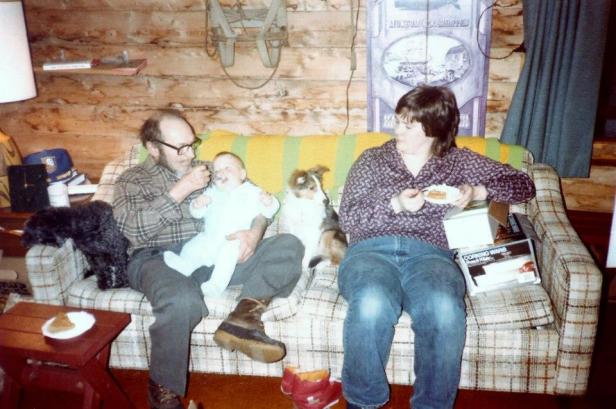
We used to visit him on weekends. Our weekend cabin was in Big Lake, Alaska, and he had property near Big Beaver Lake. He didn’t like to be bothered by salesmen or scammers, so he referred to his property as “Poverty Ridge”. At some point a friend had wood burner a sign out of some plywood. “Poverty Ridge – Mayor Smitty – Population ? Dogs”. The number of dogs was always questioned because they wouldn’t sit still long enough to be counted. He invariably wore some sort of baseball hat (usually advertising a snowmachine company or local auto dealership that he’d gotten for free), glasses, a t-shirt, heavy wool plaid button down, heavy workers pants, and those sort of all-weather rubber and leather boots.
“Poverty Ridge” was a bit of an act, if you looked in the garage and noticed all the “toys”. He had several vehicles, too. During a hospital stay my Mother and I stopped by to visit every day after she’d pick me up daycare (I was school aged then, but it was summer). In response, after he got back out to Big Beaver he called one afternoon and said, “Meet me at the Chevy dealer in Wasilla, I’m buying you a car.” With a phone call like that, you clear your schedule if it’s not already clear, and Mom and Dad took me up to Wasilla on a weeknight.
Car-buying always takes forever, even though Grandpa had already picked out the car he wanted (a new Chevy Blazer) and told them he’d write them a check. I don’t remember what the holdup was, but I remember being ushered through several different offices while everyone got a little irritated and the word finally came through that any check Smitty could have written for the purchase of a new car would be honored by the bank.
Oh yes, the dogs. Grandpa was a dog musher. The number I have in my head is 22, and when they got spooked they all howled this most marvelous racket. I only remember a few names. Kona, a white husky who had one normal eye and one had something wrong with it so it was bright blue, always wide open and round, and the pupil was always a pinprick. There was another named Kiska, and the rest I don’t think I ever knew. Ginger was Grandpa’s house pet and lived in the cabin with him; the others were sled dogs, and they had little plywood houses filled with hay, and they were chained to metal posts in the back yard. They looked like crop circles because so many of them would exercise at the length of the chain and wear paths in the dirt. It sounds somewhat cruel when it’s written out on paper, but it seemed pretty standard at the time.
Everything about the place smelled. It was a compound, really. A house, a guest house, a big garage that was full of extra sleds, snowmachines, forestry equipment, trucks, four wheelers, three wheelers – the man had a ton of stuff. The garage always smelled of dog food, oil, and grease, and the house and guest house (he moved between them at least once while I knew him) both smelled of cigarettes, bacon, and instant coffee. That’s probably the image I have of my Grandpa: sitting at his kitchen table on a frosty sub zero morning, smoking a cigarette and stirring a cup of instant coffee while the bacon cooks with the sound of barking sled dogs outside the window as though they were calling the sun into the sky from behind the mountains.
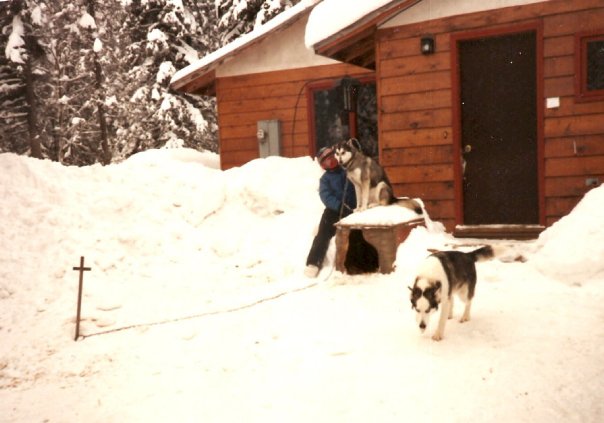
That’s me in front of Grandpa’s house. That’s Ginger in front of the door, and I’m sitting with Kooter. (I didn’t come to learn that “kooter” is slang for “vagina” until college). She had to be separated from the other dogs for some reason (although upon reflection one imagines the reason must have been why she was named Kooter). You can see the metal post and the little hut. Grandpa later built her something more substantial when he expanded the porch in front of the cabin. You can also note that I’m wearing a helmet because Mother and I had ridden across Big Lake and up to Grandpa’s house on our snowmachines, which was a lot of fun because you’d ride over these rolling hills alongside Big Lake Road once you were off the lake.
Here’s another photo of me and Kooter. She really was a nice dog.
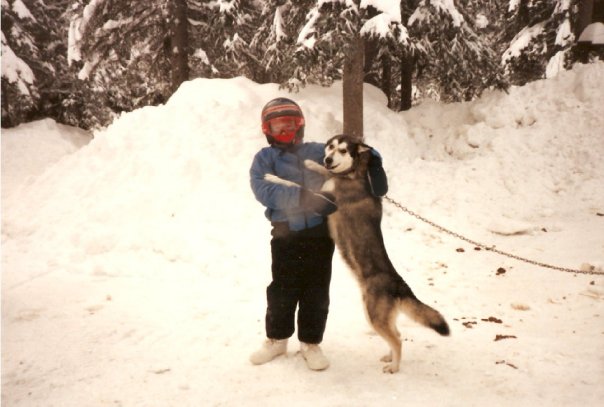
After the war, Smitty lived in Bend, Oregon with my Grandmother, who passed away long before I was born. My mom and her younger sister were born there in 1946 and 1949, and I want to say 1951 was the year they packed up an Airstream trailer and drove the “Alcan” (Alaska/Canada Highway) to Anchorage. Mother doesn’t remember much about the journey except that the road was mostly gravel, and that her Mother fed the children fig newtons so they wouldn’t be constipated after hours and hours of riding over rough terrain.
Grandpa initially worked for the Alaska Railroad, and then eked out an existence building houses in Spenard, Alaska, then a separate town from Anchorage, separated from it by Chester Creek Valley, now a neighborhood where seedy bars and no-tell motels and payday loan joints sit alongside trendy restaurants and an REI. He was a true “jack of all trades”: he’d buy property and dig out a basement, build up to the ground floor, put a roof over it, and then move the family in. They’d live in the basement while he built the house on top of them, including all the carpentry, masonry, plumbing, and electrical wiring. Once the house was finished, he’d buy land and set to work building another basement. As soon as the basement was ready he’d move the family, sell the house, and start the process over.
Up top is a picture of Grandpa with Ginger at Big Lake in September of 1990, about two months before he died. From this photo his cabin is about five miles through the trees on the shore at the upper right.
People sometimes ask my why I go by my middle name, Scott, when my first name is Richard. The answer isn’t that I particularly dislike Richard, my parents have always just called me Scott. But I was named after Smitty (who also didn’t go by Richard – sometimes he was “Dick Smith” but to just about everybody he was just Smitty).
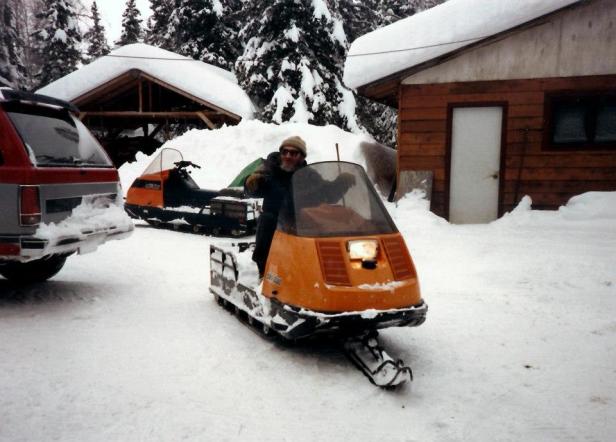
Here’s a picture of Smitty on one of his many snowmachines. The workshop/garage is to the upper right, and the hut to the upper left is for firewood and mushing equipment. He owned both snowmachines and the Chevy Blazer in this photo, and there were several other “toys” not shown. That thing is a beast, isn’t it? It’s like a tractor with a ski.
It’s funny how detailed some of the memories can be. One cold, misty morning we got a call from Smitty. He had a birthday present for me and he’d be at the marina at so and such time. So we got in the boat and went over there, and he presented me with a paper bag from the Book Cache (a now long-defunct local Alaska chain of book shops) which contained the book “Morris Goes To School”.
If you have beginning readers, I highly recommend it. I think I still have most of it memorized.
So I was in Third Grade when I woke up one morning (it happened to be Veteran’s Day) and it was much too late in the morning so I knew something must have been off. I ventured downstairs and found my Grandmother asleep on the couch. Apparently Smitty had gone for a four wheeler ride, come home, and laid down on the couch for a nap that he wouldn’t wake up from. A neighbor found him and called 911. My Uncle (Dad’s Sister’s husband), who was a volunteer firefighter and EMS in Wasilla, heard the call. Because a lot of the places in the valley don’t have street addresses, emergency workers give directions over the radio. My uncle recognized the directions as Smitty’s place, so he called my parents and they drove up in the middle of the night. That year Veteran’s Day was still a school day, but I didn’t go anyway. I went with Mom to the estate planner, who had a ground floor office at the Northeast corner of the Frontier building where I sat and watched the snow fall in big, fluffy flakes over the motorists at 36th and C St. in Midtown Anchorage while Mom talked about boring things like probate.
Ginger and Kooter went to a neighbor who was a good friend of Smitty’s, and the rest of the dogs went to other dog mushing friends. Smitty’s legacy for years was the Poverty Ridge sign, which we took to our cabin at Big Lake, as well as plenty of dog mushing paintings and posters, usually signed by that year’s Iditarod winner or a collection of the mushers who had participated. He also left us several dog sleds that he had built himself, which were used to hold presents at Christmas and which the pets liked to nestle in the cushions on during other times.
Here’s a picture of the Poverty Ridge sign that lived on at our place on the Lake for some years afterwards.
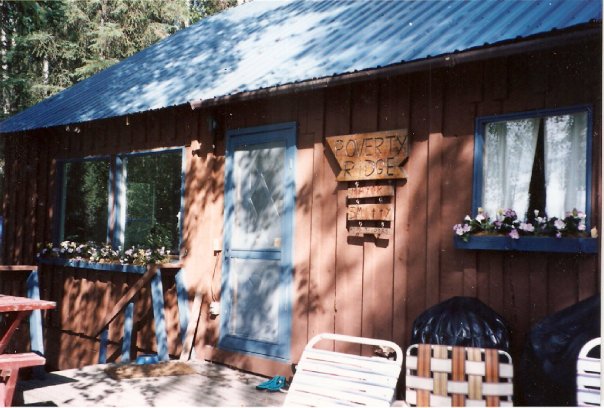
I still have “Morris Goes to School” too. And memories of 7 Layer Dip.

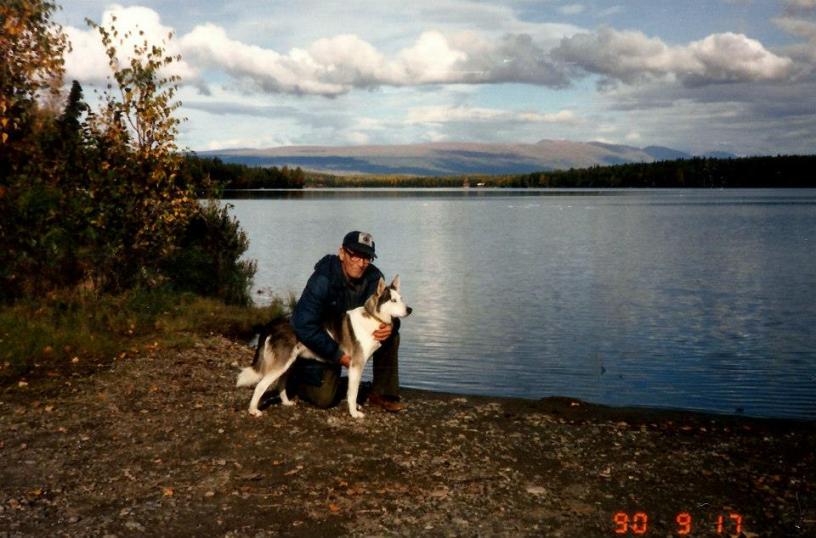
Great memories, Scott. Thanks for sharing…
LikeLike
I love hearing other people’s stories. Thanks!
BTW, I grew up in Bend.
LikeLike